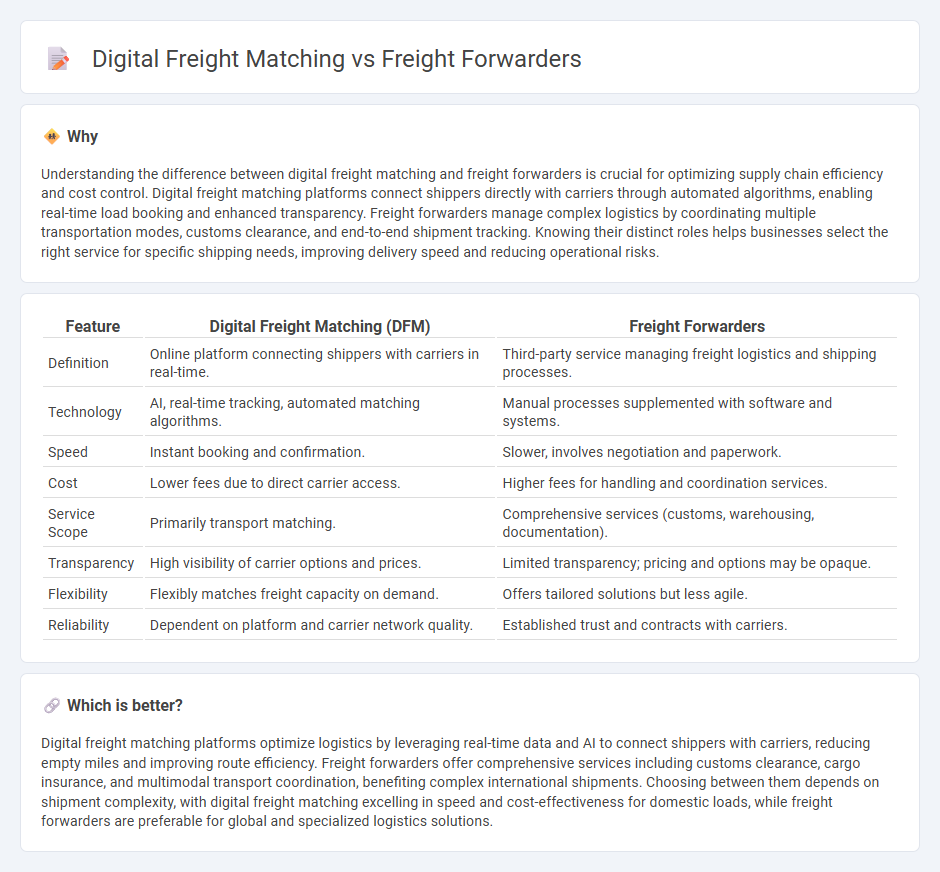
Digital freight matching platforms use real-time data and advanced algorithms to connect shippers with available carriers, optimizing load efficiency and reducing empty miles. Freight forwarders provide comprehensive supply chain management, handling freight consolidation, customs clearance, and multi-modal transport coordination. Discover how each approach can transform your logistics strategy and streamline freight operations.
Why it is important
Understanding the difference between digital freight matching and freight forwarders is crucial for optimizing supply chain efficiency and cost control. Digital freight matching platforms connect shippers directly with carriers through automated algorithms, enabling real-time load booking and enhanced transparency. Freight forwarders manage complex logistics by coordinating multiple transportation modes, customs clearance, and end-to-end shipment tracking. Knowing their distinct roles helps businesses select the right service for specific shipping needs, improving delivery speed and reducing operational risks.
Comparison Table
| Feature | Digital Freight Matching (DFM) | Freight Forwarders |
|---|---|---|
| Definition | Online platform connecting shippers with carriers in real-time. | Third-party service managing freight logistics and shipping processes. |
| Technology | AI, real-time tracking, automated matching algorithms. | Manual processes supplemented with software and systems. |
| Speed | Instant booking and confirmation. | Slower, involves negotiation and paperwork. |
| Cost | Lower fees due to direct carrier access. | Higher fees for handling and coordination services. |
| Service Scope | Primarily transport matching. | Comprehensive services (customs, warehousing, documentation). |
| Transparency | High visibility of carrier options and prices. | Limited transparency; pricing and options may be opaque. |
| Flexibility | Flexibly matches freight capacity on demand. | Offers tailored solutions but less agile. |
| Reliability | Dependent on platform and carrier network quality. | Established trust and contracts with carriers. |
Which is better?
Digital freight matching platforms optimize logistics by leveraging real-time data and AI to connect shippers with carriers, reducing empty miles and improving route efficiency. Freight forwarders offer comprehensive services including customs clearance, cargo insurance, and multimodal transport coordination, benefiting complex international shipments. Choosing between them depends on shipment complexity, with digital freight matching excelling in speed and cost-effectiveness for domestic loads, while freight forwarders are preferable for global and specialized logistics solutions.
Connection
Digital freight matching platforms streamline the process of connecting shippers with carriers by using algorithms to optimize route efficiency and load capacity. Freight forwarders leverage these platforms to access a wider network of carriers, enhance shipment tracking, and reduce operational costs. This integration improves supply chain transparency and accelerates delivery times through real-time data exchange.
Key Terms
Intermediaries
Freight forwarders serve as traditional intermediaries managing end-to-end logistics, offering personalized coordination and handling complex shipments, while digital freight matching platforms streamline the connection between shippers and carriers through automated, algorithm-driven tools that reduce costs and improve efficiency. These digital platforms enhance transparency and speed by leveraging real-time data and AI, contrasting with the human-centric negotiation and relationship management typical of freight forwarders. Explore how these evolving intermediaries impact supply chain dynamics and optimize freight management.
Platform Automation
Freight forwarders rely on established networks and manual processes to manage shipments, often emphasizing personalized coordination and service reliability. Digital freight matching platforms leverage advanced algorithms and automation to instantly connect shippers with available carriers, optimizing route planning and reducing operational costs. Explore how platform automation is transforming logistics efficiency and reshaping the future of freight management.
Real-time Visibility
Freight forwarders traditionally manage shipments through established networks, but digital freight matching platforms provide real-time visibility using GPS tracking and live data feeds to optimize routing and tracking accuracy. This instant visibility reduces delays and improves supply chain transparency by allowing stakeholders to monitor shipments in transit with precise updates. Explore how integrating digital freight matching can revolutionize your logistics operations with enhanced real-time tracking capabilities.
Source and External Links
Top Freight Forwarders List (2025) | Freightos - Freight forwarders like DHL, DSV, and Kuene+Nagel provide global logistics services including air, ocean, rail, and road freight with specialized expertise, digital solutions, and end-to-end supply chain management.
Freight Forwarders: A Comprehensive Guide, Updated For 2025 - A freight forwarder arranges the transportation of cargo on behalf of shippers, offering services such as transportation modes coordination, documentation preparation, warehousing, cargo insurance, and customs compliance.
Freight Forwarder Definition | UPS Supply Chain Solutions - Freight forwarders are third-party coordinators who contract with carriers to transport goods, advising businesses on shipping methods, cost-saving strategies, and customs, and facilitating international shipments.
 dowidth.com
dowidth.com